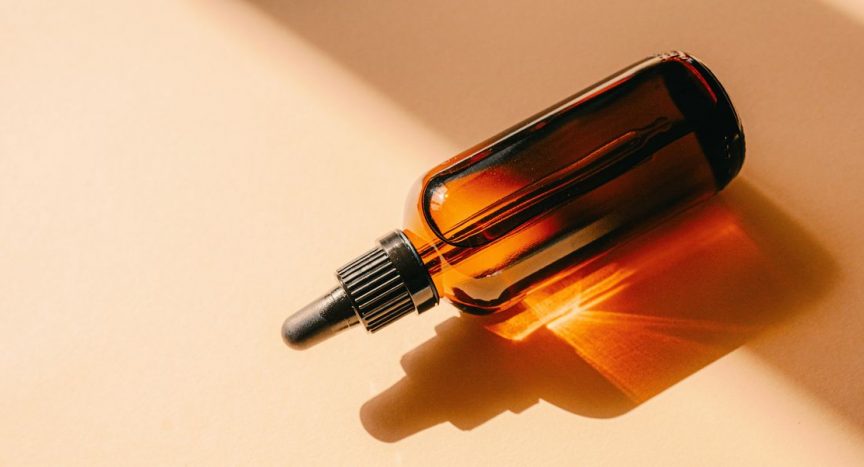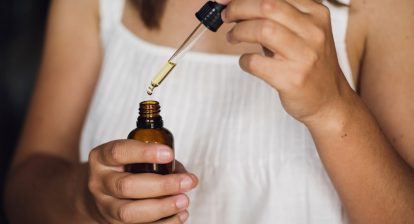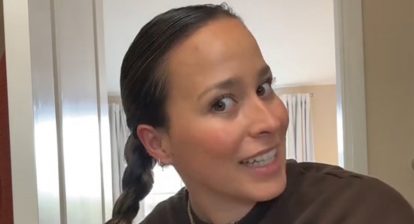While tea tree oil has a variety of medicinal uses, it’s one of the best essential oils for beauty applications. Specifically, using tea tree oil for hair can do so much for your scalp and strands. That’s right, the oil can do more than just freshen up your living space and help with acne—it’s actually one of the best hair oils for many hair types and textures.
Meet the experts: Marisa Garshick, M.D., a leading board-certified dermatologist at Manhattan Dermatology and Cosmetic Surgery in NYC; Janiene Luke, M.D., board-certified dermatologist in Loma Linda, CA; Sabrina Ahmed, Garnier’s curl expert
“Tea tree oil is antibacterial and antifungal,” and can help alleviate a variety of scalp conditions and concerns while bolstering overall hair and scalp health, explains Marisa Garshick, M.D., a leading board-certified dermatologist at Manhattan Dermatology and Cosmetic Surgery in NYC.
Ahead, experts explain the benefits of tea tree oil for hair, if it helps with hair growth, how to use the essential oil, potential side effects, and more.
Benefits of tea tree oil for hair
Experts say you may notice the following benefits of tea tree oil for hair:
Boosts overall scalp health
Your hair grows from your scalp, making it an important part of maintaining healthy hair. “Tea tree oil can help with overall scalp health given its antimicrobial, antifungal, and anti-inflammatory properties,” explains Janiene Luke, M.D., board-certified dermatologist in Loma Linda, CA.
May help with hair growth
If you’re looking for an herbal solution for promoting hair growth, tea tree oil can be a helpful part of your hair care routine. While it doesn’t directly stimulate new hair growth, “by improving overall scalp health, it can foster a healthy environment for the hair to grow,” Dr. Garshick says.
Fights dandruff
Dandruff is usually caused by a yeast called Malassezia spp., which contributes to a flaky, itchy scalp. Thankfully, tea tree oil has a research-proven ability to fight the yeast that causes dandruff, as well as the inflammation, redness, flaking, and itching that usually manifests in those with dandruff or seborrheic dermatitis, according to Dr. Luke.
Helps regulate oil production
Those with an overly oily scalp can also benefit from using tea tree oil or products containing tea tree oil to “balance excess oil production on the scalp” and extend the time between wash days, explains Sabrina Ahmed, Garnier’s curl expert.
Calms irritation
Tea tree oil is a great addition for those who struggle with uncomfortable irritation, inflammation, or itchiness on their scalp, Ahmed notes. The essential oil has anti-inflammatory properties, and when used properly can calm down an angry scalp.
Refreshes the hair and scalp
Another benefit not to be overlooked is that tea tree oil also helps with “leaving the hair refreshed, revitalized, and with a pleasant scent,” Ahmed adds.
Tea tree oil hair type considerations
Not all hair products or ingredients are designed to be used by everyone. Luckily, “Tea tree oil is suitable for all hair types and is not recommended against any specific hair type,” Ahmed explains.
However, those with certain hair types or skin concerns may want to use a varied approach when using tea tree oil. The oil is primarily used for scalp health, so Dr. Luke recommends those with sensitive skin or a sensitive scalp exercise caution when first using the oil by testing it on a small area before applying it to the whole scalp or only using it a few days per week.
“Similarly, those with dry, curly, or textured hair may want to select a product that also has moisturizing ingredients as well as tea tree oil since these hair types can have issues with dryness as well,” Dr. Luke adds.
How to use tea tree oil for hair
When it comes to the best way to use tea tree oil for hair, there are a few options. Since the essential oil is very concentrated in its pure form, diluting it with other products or using products already formulated with tea tree oil are the safest options to avoid irritation, experts advise.
Mix your own scalp oil
Try a do-it-yourself approach by mixing a small amount of tea tree oil with a carrier oil, like castor oil or coconut oil. Ahmed recommends massaging it into your scalp, which will increase blood flow to the area, and leave it in for a few minutes before washing it out with your favorite shampoo.
Add it to your shampoo
While you can find many shampoos containing tea tree oil, you can also create your own by mixing 10-15 drops of essential oil with a shampoo you already have, Dr. Garshick explains. Massage the mixture into your hair in the shower and leave it on for three to five minutes before thoroughly rinsing it out and applying conditioner.
Use products formulated with tea tree oil
Dr. Luke suggests looking for hair products (like shampoos, conditioners, masks, and scalp treatments) that are already formulated with tea tree oil “to help decrease the chance of irritation or an allergic reaction,” she explains. This is a great way to take advantage of the benefits of tea tree oil for hair if you have a sensitive scalp.
Tea tree oil for hair side effects
While tea tree oil can boost overall scalp health, it is best to start slow when first using the oil and to be aware of possible side effects. “There are instances where tea tree oil can cause adverse effects when used,” Dr. Luke explains, and says to look out for the following indicators:
- Redness
- Dryness
- Sensitivity
- Allergic contact dermatitis, which usually presents with a skin rash

Shannen Zitz is an Assistant Editor at Prevention, where she covers all things lifestyle, wellness, beauty, and relationships. Previously the Editorial Assistant at Prevention, she graduated from the State University of New York at Cortland with a bachelor’s degree in English. If she’s not reading or writing, you can probably find her frequenting the skincare and makeup forums on Reddit or hogging the squat rack at the gym.





